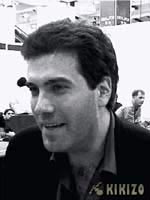An Interview with Kevin Bachus
One of the four visionaries behind what we now know as Xbox, Kevin Bachus' new company aims to set new standards in the games business. Read our in-depth interview for a fascinating look into the industry, and see what's on the horizon.
PART TWO [Click here for Part 1].
Kikizo: Aside from the risk associated - particularly with publicly traded publishers as you say - how much of a problem do you think the structure of publishers is in today's industry? Do the people who see all the concept proposals just not have the power to make decisions?
Well it's true that we don't have the same kind of entrepreneurial industry that we had ten or fifteen years ago. Back then you had a guy at the top who was probably a game developer at one point, and makes his own decisions. But that's not to say that the people running publishing companies aren't very, very good at what they do - they are, and in fact the people looking at the products at all levels, whether they're in marketing, or in production, are very good at what they do and what they recognise. The problem really, is that games have become so expensive and so complicated to produce, that it's a bigger bet than it's ever been before.
 |
"Publishers need to be responsible and run a responsible business." |
Kikizo: So if there was a new developer with good credentials in terms of their team, but who had never made a commercial game before, how far could you support them if you had confidence that their concept was a viable match to a publisher?
We're not really looking to take four guys with a dream, and turn them into a development company. What we're looking to do is to take the concepts that developers have had sitting on the shelve gathering dust for the last four years because there's been no way they can convince a publisher to put the money behind them. To find those concepts with those developers, and to turn them into a successful product. So what we're about is not so much taking a developer and teaching them to become successful, but looking at developers who've maybe had one or two products developed and are looking to make that next big jump. To bring those concepts to market that would never otherwise have made it.
Kikizo: Can you tell us a bit about the partners you're working with so far?
At this point, we're really scouring the planet, working with every developer we can find that has a great idea for a game, and the ability to build that game. We've been talking to developers in North America, in Japan and Europe. I've just had meetings with some of the most promising European developers that deserve a chance to come to retail. The publishers we're working with in the publishing industry, are of course every publisher that you might know. They range from the smaller publishers to the ones that span global territories.
There's one special partner that we're working with, and that's Sega. When we first went out to talk to publishers about what we were doing, a number of them were very excited about the opportunity to work with us. Some were keen to work with us immediately, to identify titles they could be involved in from the very beginning. Again, typically we said that that wasn't really what we're doing - we're looking at riskier titles, titles that are more difficult, that take some time to gel to the point where we feel comfortable showing them to you.
Sega on the other hand, has a tremendous history and track record of producing very innovative games, who clearly understands the development and creative processes, and was very eager to work with us. So it made a lot of sense for us to say that in the case of our first two titles, we'd be working with titles exclusively for Sega. In the future, we'll of course be working with a variety of different publishers, who are best suited to the strengths of the titles.
Kikizo: So working with Sega as a publisher as opposed to a developer, they're looking for you to bring new game concepts to them?
 |
"Our first two titles are with Sega. We find innovative but risky game concepts, fund and manage them; Sega influence, market and distribute them." |
Kikizo: So Sega will be kick starting the proceedings at CEG. Great stuff. Are you talking to America or Japan?
We're working with Sega of America. Sega have very strong aspirations for growth in North America, and we're certainly excited about being part of that growth.
Kikizo: Who are your financial partners, the companies advising you financially?
The people who've been investing in CEG are the same kind of people who invest in film production. Wealthy individuals, in some cases some institutional investors, that are looking to be part of an industry that clearly has a lot of growth ahead of it, to take advantage of the return on investment that successful games can produce. So we've been very fortunate that the investment community has worked with CEG and recognised the opportunity to invest.
Kikizo: And all going to plan, where do you see CEG firstly in one year from now, and secondly in five years from now?
Well one year from now, we'll hopefully have a portfolio of extremely strong titles, that are exciting, that people want to play, that have the potential to really ignite the gamers' imaginations and fuel their interest in our products. Five years from now, we can demonstrate that we have great relations with all the major publishers, great relations with all the developers, and that CEG products are consistently head and shoulders above certainly the industry average.
 |
"One year from now, we'll hopefully have a portfolio of extremely strong titles." |
Well certainly! You know, one always hopes to be indispensable. I don't think we have quite that amount of arrogance about what we're trying to do. At the end of the day we're trying to be a company that produces great games, that people like to play. And if that means we can be successful and thought of well, then certainly that's something that we'd find very, very pleasant.
Kikizo: It seems the way you're trying to merge the commercially viable with the original game concepts that gamers crave is a pretty heartfelt and ambitious model - is this close to your personal feelings and goals in the business?
We believe very strongly that what's good for gamers is good commercially as well. And that it's just a difference of philosophy in trying to determine the potential of a game when making a financial investment. So we're looking at game concepts that are very different to those of other publishers. But they have different pressures that we have, which means we're able to do things they might not be in a position to do, and is one of the reasons publishers are so excited about working with us. I think that, at the end of the day, our goal is to produce games that can be as commercially successful as possible, and to do it by producing games that are good for gamers.
Kikizo: Kevin, thanks very much for your time and good luck.
My pleasure.
Adam Doree
Kikizo Games





 Satoru Iwata Video Interview - the late Nintendo president spoke with Kikizo in 2004 as 'Nintendo Revolution' loomed.
Satoru Iwata Video Interview - the late Nintendo president spoke with Kikizo in 2004 as 'Nintendo Revolution' loomed. Kaz Hirai Video Interview - the first of Kikizo's interviews with the man who went on to become global head of Sony.
Kaz Hirai Video Interview - the first of Kikizo's interviews with the man who went on to become global head of Sony. Ed Fries Video Interview - one of Xbox's founders discusses an epic journey from Excel to Xbox.
Ed Fries Video Interview - one of Xbox's founders discusses an epic journey from Excel to Xbox. Yu Suzuki, the Kikizo Interview - we spend time with one of gaming's most revered creators.
Yu Suzuki, the Kikizo Interview - we spend time with one of gaming's most revered creators. Tetris - The Making of an Icon: Alexey Pajitnov and Henk Rogers reveal the fascinating story behind Tetris
Tetris - The Making of an Icon: Alexey Pajitnov and Henk Rogers reveal the fascinating story behind Tetris Rare founders, Chris and Tim Stamper - their only interview? Genuinely 'rare' sit down with founders of the legendary studio.
Rare founders, Chris and Tim Stamper - their only interview? Genuinely 'rare' sit down with founders of the legendary studio. The History of First-Person Shooters - a retrospective, from Maze War to Modern Warfare
The History of First-Person Shooters - a retrospective, from Maze War to Modern Warfare